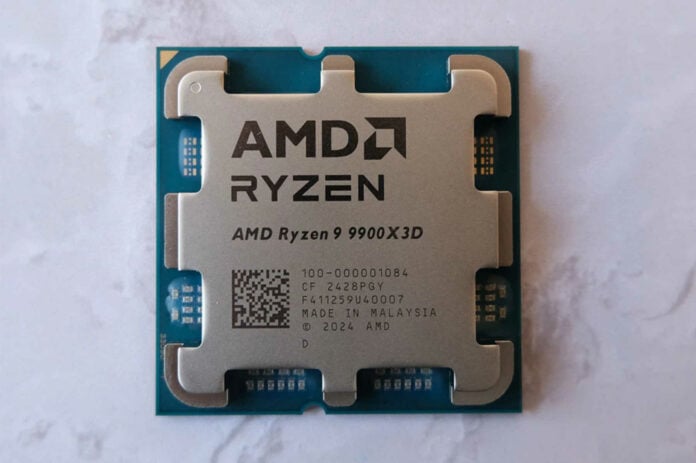Following the smashing success of Ryzen 7 9800X3D, enthusiast builders are patiently waiting for Ryzen 9 9900X3D and 9950X3D to materialise. The wait won’t be much longer according to new rumours. However, the launch may come with a tinge of disappointment as AMD is apparently remaining frugal with its placement of 3D V-Cache.
According to X user AnhPhuH, AMD plans to launch Ryzen 9 9900X3D and 9950X3D by the end of January 2025. This almost certainly confirms that the company will reveal both processors during its CES 2025 keynote in the same month. If so, we could see Zen 5 X3D break cover alongside the first RDNA 4 graphics cards.
Sadly, AnhPhuH also claims that only one of the two core complex dies (CCDs) on each CPU will feature 3D V-Cache. This means Ryzen 9 9900X3D and 9950X3D will mirror their predecessors, Ryzen 9 7900X3D and 7950X3D in this regard. However, the cache location differs slightly between the two generations, now resting underneath the CCD rather than on top of it.
The reason this will prove disappointing to many enthusiasts comes down to scheduling between CCDs. Both Windows 10 and 11 do not reliably schedule gaming applications to the CCD with additional L3 cache, leading to unexpectedly worse performance. Of course, this isn’t a problem on the likes of Ryzen 7 9800X3D or 7800X3D as each only has a single CCD.
In addition to the architectural benefits of Zen 5, both Ryzen 9 9900X3D and 9950X3D should thankfully support overclocking. Each will undoubtedly boost performance, with applications like Process Lasso helping to mitigate incorrect CCD scheduling by forcing software to run on specific CPU cores.
Naturally, we won’t know anything for sure until AMD reveals its hand. While this rumour seems completely plausible, I still hope it proves false. A Ryzen processor rocking 3D V-Cache across each CCD would be a wonderful product and further demonstrate the value of having oodles of L3 cache. In the meantime, I’ll keep saving up for a Ryzen 9 9800X3D.
I am confident, though, that Ryzen 9 9900X3D and 9950X3D will mirror their non-X3D counterparts with the same core and thread count. More specifically, the former should pack 12 cores and 24 threads while the latter packs 16 cores and 32 threads. Check out the Club386 Ryzen 9 9950X vs. Core Ultra 9 285K guide to see how so many Zen 5 cores stack up against their primary competition.

